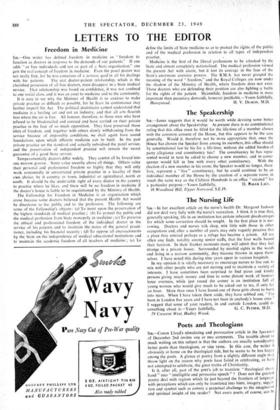LETTERS TO THE EDITOR
Freedom in Medicine
SIR,—Ono writer has defined freedom in medicine as " freedom to function as doctors in response to the demands of our patients." If one adds "as free individuals and not as part of a State organisation," one gets the real concept of freedom in medicine. Even the panel doctor was not really free, for he was conscious of a terti ttttt quid in all his dealings
with his patients. The real doctor-patient relationship, which is the cherished possession of all free doctors, must disappear in a State medical service. That relationship was based on confidence, it was not confined to one social class, and it was an asset to medicine and to the community.
It is easy to see why the Minister of Health is so anxious to make private practice as difficult as possible, for he fears its continuance may further imperil his Act. The political doctrinaire cannot understand that medicine is a healing art and not an industry, and that all arts flourish best where the air is free. All honour, therefore, to those men who have refused to be blackmailed and coerced and have carried on their private practice in the face of so much opposition. They have preserved those islets of freedom, and, together with others slowly withdrawing from the service because of impossible conditions, we shall again have • sound foundations upon which efficient medicine can be built. In the past private practice set the standard and actually subsidised the panel service, and the preservation of independent practice will remain the surest guarantee of a good State service.
Temperamentally doctors differ widely. They canrfot all be forced into one narrow groove. Some value security above all things. Others value their personal and professional freedom so highly that they will only work contentedly in unrestricted private practice in a locality of their own choice, be it country or town, industrial or agricultural. north or south. It should be the undeniable right of every doctor in the country to practise where he likes, and there will he no freedom in medicine if the doctor's house is liable to be requisitioned by the Ministry of Health.
The Fellowship for Freedom in Medicine is an organisation which arose because some doctors believed that the present Health Act would be disastrous to the public and to the profession. The following arc some of the Fellowship's objects: (a) To insist upon the preservation of the highest standards of medical practice ; (h) To protect the public and the medical profession from State monopoly in medicine ; (c) To preserve the ethical and professional freedom of the individual doctor in the service of his patients and to maintain the status of the general practi- tioner, including his financial security ; (d) To oppose all encroachments by the State on the independence of medical educational institutions and to maintain the academic freedom of all teachers of medicine ; (e) To define the limits of State medicine so as to protect the rights of the public and of the medical profession in relation to all types of independent practice.
Medicine is the first of the liberal professions to be attacked by the Slate and almost completely nationalised. The medical profession viewed the present Act with alarm, but it lost its courage in the face of the State's enormous coercive powers. The B.M.A. has never grasped the meaning of the word " freedom," and the Royal Colleges are now under the shadow of the Ministry of Health, where freedom does not exist. Those doctors who are defending their position are also fighting a battle for the rights of the patient. Menwhile, freedom in medicine is more important than pecuniary demands, however justifiable.—Yours faithfully,


































 Previous page
Previous page